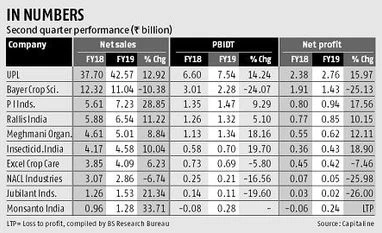Agricultural input companies have posted decent growth in revenue and net profit for the quarter ended September, with sales rising on normal monsoon rain and price hikes.
PI Industries, for example, reported a 29 per cent jump in revenue to Rs 7.2 billion from the same period last year. Net profit grew 17.5 per cent to Rs 944 million. Rallis India posted 11 per cent growth in the quarter's revenue to Rs 6.5 billion and a 10 per cent jump in net profit to Rs 852 million.
While companies have been able to pass on their raw material price hikes to consumers, the lag time of four to six weeks in absorbing the hike did marginally affect their profit margin. They aim to achieve the full benefit of the price hikes in the December quarter.
"Performance across the business segment remained good despite the erratic southwest monsoon this kharif season. Though classified as normal, at a deficit of 9.4 per cent against the Long Period Average, only 68 per cent of areas received normal rainfall. Our close working with farmers in providing knowledge, products and information to deliver better value out of crops delivered robust growth despite market challenges, like increased raw material prices and fluctuating commodities prices. We do hope for a better rabi season, with a normal forecast for the northeast monsoon and improved reservoir water levels," said V Shankar, managing director (MD) at Rallis India, part of the Tata group.
Export-centric UPL posted 13 per cent growth in revenue, primarily because of an eight per cent jump in its September quarter volume growth. UPL generates a little over 80 per cent of revenue from export -- it raised product prices by an average of four per cent, as against declines of four per cent and one per cent in financial years 2016-17 and 2017-18, respectively. Other agri input companies have also raised their product prices by the same tune. Value-added and specialised chemicals saw double-digit price rises during the quarter.
"We are on a growth path due to steady demand. We are also working on the development of new products at affordable prices," said Rajesh Aggarwal, MD at Insecticides India.
The gross margin at PI Industries stayed under pressure (down 513 basis points over a year, to 42.9 per cent) due to higher input costs. These offset higher volume growth in both the domestic and export businesses.
"The growth in domestic (24 per cent over a year) and export (32 per cent) businesses was majorly led by higher volume growth. The management maintained its guidance (expectation) of 18-20 per cent for FY19 and expects to be on the higher side of the range. The company plans to launch two-three products every year in both segments," said Archit Joshi, an analyst with HDFC Securities.
BASF India and Sharda Cropchem also reported double-digit growth in revenue and profits, on higher sales volume.
"Rising raw material costs across the segment affected the operational performance of all the key segments, with additional pressure coming from the rupee's depreciation (down 4.1 per cent from the earlier quarter), which the company has not been able to pass on immediately to customers, resulting in an additional cost burden to the tune of Rs 540 million," said Amar Mourya, analyst with Emkay Global, on BASF India's results.
To read the full story, Subscribe Now at just Rs 249 a month
Already a subscriber? Log in
Subscribe To BS Premium
₹249
Renews automatically
₹1699₹1999
Opt for auto renewal and save Rs. 300 Renews automatically
₹1999
What you get on BS Premium?
-
Unlock 30+ premium stories daily hand-picked by our editors, across devices on browser and app.
-
Pick your 5 favourite companies, get a daily email with all news updates on them.
Full access to our intuitive epaper - clip, save, share articles from any device; newspaper archives from 2006.
Preferential invites to Business Standard events.
Curated newsletters on markets, personal finance, policy & politics, start-ups, technology, and more.
Need More Information - write to us at assist@bsmail.in
)